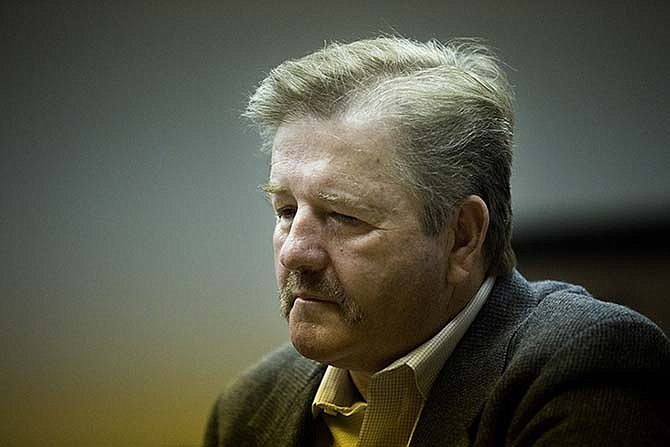A three-judge appeals court panel this week found no legal reason to overturn Kurt A. Steidley's conviction and seven-year prison sentence for arson in the Jan. 1, 2011, fire at Everhart's Sporting Goods, 2436 Missouri Blvd. - where Missouri Valley Mercantile now is located.
Steidley had closed the business a week earlier, following a couple years of declining sales.
The Kansas City appeals court Tuesday canceled Steidley's $250,000 appeals bond and issued an arrest warrant for him.
Two different Cole County juries had convicted Steidley, now 57, of Knob Noster, of second-degree arson, and after the second trial, Cole County Circuit Judge Dan Green in January 2016 ordered the sentence.
But Steidley stayed out of prison while his case was appealed.
The first jury conviction came in January 2014, but Green set aside that verdict and ordered a new trial after agreeing with Steidley's first attorney - Shane Farrow, of Jefferson City - the judge had blocked, then later allowed, some testimony about a conversation Steidley had with Jason Turner, Jefferson City's then-interim fire chief, during the initial investigation after the fire.
The second trial came in September 2015, and the appeals court Tuesday rejected Steidley's argument that five different mistakes were made in it.
First, he argued the state never proved there had been an arson fire.
But, Judge Cynthia L. Martin wrote in the three-judge panel's 23-page opinion, "Fire investigators determined that the fire was intentionally set using an ignitable liquid and a hand-held, open flame."
Steidley's attorney during the second trial - Christopher Slusher, of Columbia - twice asked Green to acquit Steidley of the charge, arguing the state had failed to prove Steidley's guilt.
Green denied the motion, and the appeals court agreed the prosecution had "presented sufficient evidence from which a juror could conclude beyond a reasonable doubt that the fire at Everhart's was of an incendiary origin" and Steidley had set it.
Steidley's appeal also argued he should have gotten a new trial because prosecutors had failed to disclose information the Federal Bureau of Alcohol, Tobacco, Firearms and Explosives (ATF) had gathered about Drew Buersmeyer - an Everhart's customer who, Steidley said, owed the business money and suggested during the trial that was a reason for Buersmeyer to set the fire.
But, the appeals court noted, Steidley's attorneys already had served subpoenas on ATF, four days before the 2015 trial began, and prosecutors had told Green they didn't believe Steidley's efforts to get ATF's records would be any more successful than the state's efforts had been.
Additionally, an ATF agent testified during the trial that their investigation into Buersmeyer had cleared him of any involvement in the fire.
So, the court ruled, Steidley's case wasn't damaged because it hadn't been given the ATF materials.
The appeals court also rejected Steidley's arguments that prosecutors had asked one witness "leading questions" during his testimony, Green had failed to interrupt Prosecutor Mark Richardson's closing argument and Green wrongly had allowed hospital records to be presented as evidence.

